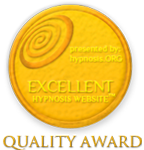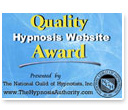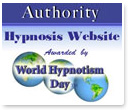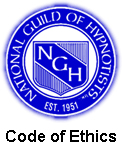
by Charles Curtis
There are many approaches to hypnosis, each with its army of disciples, canon of established “truth”, and sales pitch of anecdotal results. If your already established methods are working well, why learn yet another approach? In particular, in a world competing for your time and training dollars, why spend a series of days and a chunk of money learning something with a strange name like “Neuro-Linguistic-Programming”?
The answer is…if you want to become a master at what you do…if you would like the hypnosis process to become more effortless…if you would like to achieve a real grasp of why and how inner change occurs…if you would like to achieve a subtlety in your work that didn’t previously seem possible…you might want to consider getting trained in NLP.
NLP Provides Sophisticated Induction Methods
Consider the art of induction: Most hypnotists today are trained in several script reading approaches, and if they have taken any of several state-of-the-art trainings, in instant inductions as well. But an NLP-trained hypnotist has many more options. She can put a client in deep hypnosis simply by paying attention to breathing patterns, or communicating using the language of sensory awareness, or even by engaging in a seemingly normal conversation that is laced with hidden NLP language patterns.
NLP provides the knowledge and tools to slide past resistance…
Some clients are “natural somnambulists” and just about anything you do will put them in trance deep enough to get the job done. Other clients, especially analytical ones, will resist your best efforts, thinking about what is happening in the session rather than giving in to the healing process. NLP provides the knowledge and tools to slide past that resistance and communicate relaxing suggestions directly to the client’s subconscious in very effective ways.
Once in trance, the hypnosis must be completed. When the client has been traumatized, old emotional pain often lies hidden behind seemingly impenetrable doors in the subconscious mind. Direct suggestion is useless when the problem is so deeply buried. Age regression techniques, while often effective in such circumstances, can sometimes be stymied if the client’s defenses are strong enough.
Knowledge of NLP gives you the tools to navigate your way through the defense systems of these difficult clients, so you can turn these hypnotic quagmires into victories. For example, an Initial Sensitizing Event that is stubbornly staying hidden will often reveal itself, if the emotional charge surrounding it is first reduced with NLP. And the NLP Practitioner learns ways to pump up the efficiency of such techniques as Informed Child, so the effects are even more effective than they would otherwise be.
In addition, some clients, such as the frail elderly, and medical patients recovering from severe illness or injury, are not good candidates for the abreactive process. In any case, it’s simply not possible to do the noisy pillow pounding of abreaction hypnosis in certain situations, such as nursing homes and other crowded medical environments.
There’s some definite business to be had if you have the training to handle that kind of “house call” and that kind of “special needs” client. In such cases, being trained in a quiet peaceful process, such as NLP, that can be carried out in a conversational way, can make the difference between being able to say “No problem! I’ll be there Tuesday at 2”, and matter-of-factly getting the job done, and having to say, “Sorry, the techniques I know can’t be used in your situation. I can’t help you.”
NLP Makes More Aware of What is Occurring Inside the Client
Besides providing a sophisticated model of induction and change, and a useful set of tools for augmenting your present skill set, NLP training also helps you become much more “present in the body”. NLP Practitioners have a great deal more awareness of sensory distinctions than most hypnotists. And beyond that, they know how to use this information to deepen trance, defuse resistance, and cement change in place.
The NLP Master Practitioner is trained to read and respond to the body language of the client at a very sophisticated multi-sensory level. Consequently, while the direct suggestion hypnotist is scratching her head wondering what to do now because her script didn’t work, the NLP Practitioner is able to elicit and defuse the strategy with which the client was distressing himself, and the hypnosis is successfully completed. This “secret weapon” gives the NLP Practitioner additional resources in difficult situations, an edge that can mean the difference between frustration and success.
NLP training is designed to augment rather than replace your existing knowledge. So NLP is not only a coherent system of interventions in its own right, it also gives you the knowledge and sensory awareness to fine tune your already existing theoretical orientation. For example, if you are a skilled direct suggestion hypnotist trained in regression, NLP training will sharpen your script-reading and regression skills, teaching you voice inflections that give you greater effectiveness. You will also become able to read the client’s physiological signs better than ever before, knowing when to change course and ad lib your script or regression technique in a new direction. When a sufficient level of skill is reached, scripts become unnecessary, for the NLP Master Practitioner lets his knowledge of the principles guide his actions in a fluid, flexible, intuitive fashion.
Historically, NLP grew out of linguistic analysis in the 70s by Richard Bandler and John Grinder, later joined by Judith Delozier, Robert Dilts, Leslie-Cameron Bandler, and David Gordon, as they studied Virginia Satir (family therapy), Fritz Perls (Gestalt therapy), Milton Erickson (Ericksonian hypnosis), and Gregory Bateson (the anthropology of psychotherapy).
Today, there are many NLP schools worldwide, which have trained thousands of NLP Practitioners to help all kinds of clients improve their lives. In addition, many psychotherapists and hypnotists use their knowledge of NLP to augment their already existing hypnotic approaches. Besides hypnosis, NLP has many other exciting uses, such as better business communications, higher sales, better grades in school, improvement in sports, and more enjoyment of life.
How to Become Trained in NLP
NLP Practitioner Tony Robbins and others in the business field have popularized NLP’s usefulness in the areas of business and professional communications, so much so that there is a popular image of NLP in the public’s mind as a technology primarily for influencing the opinion of others. But just as there is much more richness and depth to the field of Ericksonian hypnosis than the stereotype of “indirect suggestion”, so there is much more to the NLP field than its popular image of “anchoring”.
The field of NLP today consists of two levels of training: “NLP Basic Practitioner” and “NLP Master Practitioner”. The Basic Practitioner learns a complete set of useful NLP patterns that cover the gamut of hypnotic problems. The Master Practitioner goes beyond the mastery of patterns to learn why these patterns work, including the linguistic modeling process that brings them to life. Along the way, he masters a set of language patterns that give him pinpoint control over the client’s subconscious.
The very nature of NLP, being based on modeling, encourages hypnotists not only to become proficient in existing patterns, but to extend the field by developing new NLP patterns. In fact, one part of the final exam of the Master Practitioner course is to develop and submit a new NLP technique or variation.
NLP trainings are now offered worldwide. There are many different types of NLP organizations offering many different types of trainings. You can choose a 7-day accelerated course, take a 14-21 day full-immersion intensive, enroll in a multi-semester university level course that dissects arcane linguistic details, or attend an 8-month training covering extensive theory and supervised practice.
For those on a smaller budget, there are numerous books and multi-media courses available from many sources on tapes, CDs, and DVDs. These self-study courses range from the layman’s level “Personal Power” books, through graduate-level university texts describing sophisticated hypnotic interventions and language distinctions, to entire trainings on multiple DVDs.
One interesting feature of NLP training is that, in most courses, student hypnotists practice the techniques on each other. There are several benefits to this. First of all, you not only get to experience performing the technique in a supervised setting, but you also get to experience it. And as you learn each new idea, you get to work on your own “stuff”.
This training approach works well because NLP processes are not abreactive. Consequently, student hypnotists don’t have to worry about the training process unearthing messy emotions or buried childhood secrets. Instead, the focus is on studying distinctions in sensory awareness at the external physiological and internal subjective level. A student practitioner focuses on mastering such distinctions as to how to objectively gauge and use his training partner’s breathing patterns to deepen depth of trance. At the same time, he is monitoring his own subjective experience, performing such exercises as calibrating his own internal visual images to make himself more successful as a hypnotist. In the process of doing these step-by-step exercises, his partner’s and his own dysfunctional behavior patterns and areas of emotional pain simply disappear.
Many Benefits of Learning NLP
People take NLP training for many reasons. Whether they are professional hypnotists, or come from another field and plan to use NLP communications skills in a profession or business, or are just taking the course for personal improvement, there are many benefits and much to learn. Many graduates have gotten far more than they expected, finding their NLP training to be a turning point in their professional careers.
The world of NLP is interesting, exciting, and profoundly useful. The next time you are considering what training to take, consider NLP. You won’t be disappointed.
(Charlie Curtis is an NLP Master Practitioner and Certified Trainer for the National Federation of Neuro-Linguistic Psychology.)






